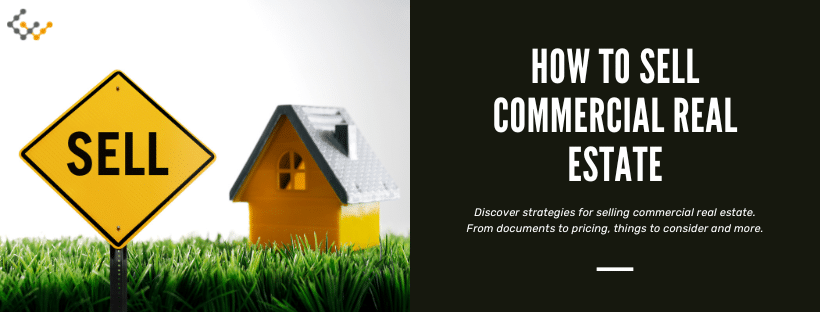How to Sell Commercial Real Estate: 5 Tips

Selling commercial real estate is significantly different than selling residential property. Though the process of transferring real estate from person to person may be similar, there are numerous other factors owners must take into consideration before simply deciding to list their commercial property for sale, including understanding their target buyer, what type of property they are selling, and the value of the property.
How Long Does it Take to Sell a Commercial Property?
Moving at a much slower rate than residential real estate, commercial property takes between 6 months and 12 months to sell, on average. This depends on numerous factors, including the desirability of the location, the type and condition of the property, and the type of ownership structure in place. Due diligence completed by the buyer typically is one of the factors that slows this process down.
Answer a few questions and get custom mortgage quotes. We'll match you with offers from our network of 650+ lenders.
How to Sell Commercial Real Estate: 5 Tips
Consider the following commercial real estate tips for selling.
#1: Determine Fair Market Value
The first step is to determine the property’s fair market value based on what buyers are most likely to pay. To do this, it is necessary for owners (or their commercial real estate agents) to factor in several key factors:
- Condition
- Value for the community
- Similar properties in the area and recently sold comps
- Unique features or value-added components
- Sales prices for the original purchase
- Overall market condition
#2: Gather Title Report and Environmental Reports
Most often, property owners will need to obtain a title report that outlines the title’s history. Doing this early on helps ensure the report showing the property can be sold is in hand. Update any applicable environmental reports as well. Any over six months old may need to be updated to disclose any potential environmental risks with the property.
#3: Gather Documentation and Service History
Spend the time gathering all necessary documents needed to sell a commercial property. This should include all paperwork showing ownership, property permits, and necessary certifications. The key here is to have all data, including rent roll, profit and loss statements for the previous two years, and other documentation ready to present to would-be buyers.
It also helps to have a service history outlining all plumbing, electrical, HVAC, elevator, fire, and other major system inspections, repairs, upgrades, or concerns. Ensure that there is clear documentation of the investments made in these areas.
#4: Market the Property
Work with a commercial real estate agent or market the property directly for sale. Use commercial real estate websites, social media, and local signage where appropriate to market to sellers. Paying for marketing services to help with this process may be beneficial.
#5: Navigate Any Questions as They Occur
Over time, buyers will have numerous questions, as that is a valuable part of the due diligence process. Be accessible to them to ensure it is easy for the buyer to obtain the critical information they need right away.
What are the Costs Involved in Selling Commercial Property?
As the property seller, the costs of selling commercial property will range based on numerous factors. Typically, this includes a commission paid to the real estate agent and brokerage that ranges from 4% to 8%. Additional fees may apply, including appraisal fees, inspection costs, and others, depending on the property type and transaction.
Are There Tax Implications When Selling a Commercial Property?
Selling commercial real estate often results in some tax implications depending on the ownership structure and type of property. Depending on the location and property type, sellers can expect to pay federal and state taxes on the sale at the local rate. More so, the seller (and the buyer) must report the sale to the IRS, which could result in income tax implications.
In situations where the property is a 1031 exchange, work with an accountant to manage the tax implications. This method allows for the deferring of paying taxes but still requires the preparation by a tax professional.
Can You Sell Commercial Real Estate Without a Realtor?
There is no legal requirement that a property owner use a real estate agent to sell commercial property. The process may require the use of an attorney to help with the legalities of creating and managing the ownership change, as well as the contract negotiations. It may also be necessary to use a title agency to pursue the title transfer process. Still, there is no requirement to use a real estate agent to sell commercial property.
Do You Need a Special License to Sell Commercial Real Estate?
While some states may require a real estate agent to have specific education in commercial real estate sales to sell it, not all states require a special license to do so. It is critical to look at experience in selling commercial real estate since the two types are very different.
5 Factors to Consider When Selling a Commercial Property
As a commercial real estate owner, one of your primary goals is to consider how quickly it can be to sell the property. The following strategies are important factors to consider to balance both the speed of the sale and obtaining adequate compensation for the property itself.
- Due diligence commonly slows down the process but can be sped up if the property owner has all updated accountant information, profit and loss statements for several years, and rent rolls in hand.
- Pricing of the property is critical and must be considered from a very different standpoint than just what the owner believes the property is worth or what is owed on an existing loan. Market conditions change often in many areas, and the right pricing will be necessary to not only interest buyers but to ensure a commercial loan is accessible.
- Ensure the property can be financed by commercial real estate loans through the SBA and other commercial lenders. The key here is to ensure that financing is possible for the property.
- Consider the inspection process to be one of the most common delays, especially if there are known problems present. Be sure to wrap up any concerns and work with the real estate agent to ensure the property can be inspected efficiently.
- Carefully evaluate the various types of real estate buyers, including cash property buyers, if applicable. The key here is to consider the costs associated with the type of buyer, the expectations for the closing from those properties, and other factors, especially if the property is off-market and receives an offer.
3 Things to Avoid When Selling a Commercial Real Estate
Prior to selling commercial real estate, consider the following:
- Avoid not working with a commercial real estate agent. These professionals have industry knowledge and local expertise.
- Don’t avoid selling in a down market, but carefully evaluate the value of the property and the desired funds to sell at the desired price point.
- Commercial real estate investors may place offers on property at a low starting point. Avoid accepting a too-low offer just to sell quickly.
Wrapping Up
Selling commercial real estate is a process that requires industry knowledge and a local focus. Consider all aspects of the process before listing a property on the market.

